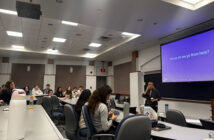
Brian Reiff
The gender wage gap is a little like evolution.
The majority of people believe it’s real, while others swear it’s just a myth.
But while the evolution skeptics might never change their belief, there is tangible evidence showing the continued existence of a gender wage gap.
One system in which this was blatant was USA Hockey. The women on the U.S. national team were paid just $6,000 every four years by USA Hockey — $1,000 per month during the six months they trained together for the Olympics and next to nothing for the other 42 months.
This was true despite the women training and competing year-round, 48 out of 48 months. According to Julie Foudy, a 17-year-old member of the U.S. national soccer team, half of the current women’s hockey team works two or three jobs just so they can have enough money to continue playing.
It should’ve come as no surprise then, when the U.S. women’s hockey team announced March 15 it would be boycotting the World Championships — an event it had won each of the previous three years — after a year of negotiations with USA Hockey produced no results.
“We are asking for a living wage and for USA Hockey to fully support its programs for women and girls and stop treating us like an afterthought,” captain Meghan Duggan said.
Negotiations between the two sides apparently continued even after the announced boycott, but USA Hockey looked for other solutions as well. The organization began looking for replacement players to take the place of those who refused to play, but that signal only hardened the resolve of those on the team.
The team released a statement after this news came out, reiterating the purpose of the boycott and stating, in no uncertain terms, that it would continue. It went on to say a potential agreement between the two sides would aim to benefit future generations of players in addition to the current one, which gave the team confidence the younger players being approached by USA Hockey would also choose not to play.
That confidence turned out to be well-placed.
USA Hockey faced difficulty finding athletes that would play, with many potential players stating on social media they had rejected offers to join the roster. USA Hockey got so desperate it resorted to contacting players on under-16 teams, demonstrating the fortitude shown by women across all levels to fight for the greater good.
As the women’s hockey players continued their boycott, various national sports organizations expressed their support for the player’s actions. The day after the boycott was announced, the commissioner of the National Women’s Hockey League made clear the NWHL stood behind it.
Later, the NBA Players Association issued a statement saying it too supported the players’ efforts for fair and equal treatment. The MLB Players Association tweeted its support as well, as did the NFL Players Association.
Perhaps the most significant organization to express its support, though, was the NHL Players Association, which issued a statement saying NHL players fully supported the women’s national team’s boycott. More than that, NHL players threatened to boycott the men’s world championships as well if the women’s dispute wasn’t settled, according to USA Today.
It was likely this combined unity, not only from inside the program but also from outside it, made the difference in the end for the team. On March 28, the two sides reached an agreement, with the players set to make upward of $70,000 a year under the new contract.
What these women did by standing up for what they believe in is nothing short of remarkable.
Even more remarkable is that everyone was on the same page. If some players had opted out of the boycott, or if the replacement players had agreed to play, the team might have lost the leverage it had. The potential deal would have subsequently fallen through.
But because everyone in the program understood the need for drastic change, the players were able to earn a major victory, not only for themselves but for women all around the country who are fighting for equal pay.
That victory led to another, as the women won their fourth straight World Championship Friday night.
Let’s hope women in other professions find similar success soon.
—
Brian Reiff, ’17, is the deputy sports editor for The Brown and White. He can be reached at bsr217@lehigh.edu.





Comment policy
Comments posted to The Brown and White website are reviewed by a moderator before being approved. Incendiary speech or harassing language, including comments targeted at individuals, may be deemed unacceptable and not published. Spam and other soliciting will also be declined.
The Brown and White also reserves the right to not publish entirely anonymous comments.